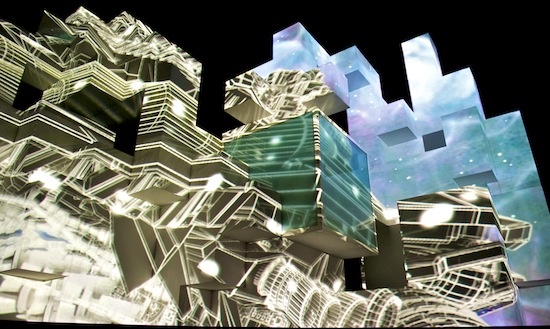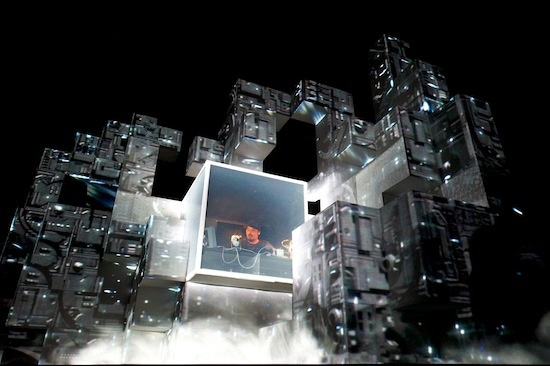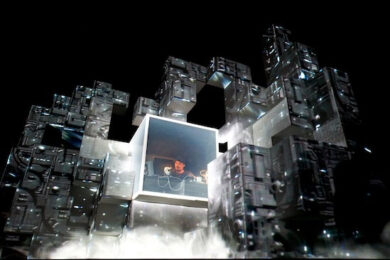Photos by Valerio Berdini
Space, as Douglas Adams reliably informed us, is big. Really big. It’s a concept not lost on Amon Tobin and his ISAM 2.0 stage show, although choosing the South Coast’s Bexhill-On-Sea – an inspiration for Dad’s Army if ever there was one – as one of just two UK venues for his jaw-dropping drum & bass sci-fi spectacular is about as far from the future as you could possibly be.
For those unaware of it, the De La Warr Pavilion is an art deco/modernist marvel. In a gesture unimaginable among today’s aristocracy, committed socialist Herbrand Sackville, the 9th Earl De La Warr, gifted the pavilion to the working class in the 1930s in order that they had somewhere to appreciate art and culture. Since its renovation in 2005, it has witnessed some unlikely artistic pairings. When The Fall played there in 2008, cross-dressing potter Grayson Perry opened his Unpopular Culture exhibition the same night, his twittering (with a small ‘t’) retinue a-fluster that a genuine working class northerner was performing in the auditorium next door.
Folktronica act Tunng, meanwhile, chose to launch their cultural and musical mash-up tour with Touareg blues band Tinariwen at the DLWP after just an afternoon’s rehearsal (watch a video here). And among the Pavilion’s permanent exhibits is artist Jeremy Deller’s provocative Acid Brass, a flow chart that dovetails the social upheaval of late-80s protest with the musical revolution of acid house.
Neither the DLWP nor "Brazil’s foremost drum’n’bass artist" Amon Tobin are exactly newcomers to something just that little bit different. When Tobin wanted to tour his latest album, ISAM, he needed something remarkable to accompany it for, in truth, its clanking, found-sound drum & bass is a challenging listen even during its most musical moments. How challenging? Let’s just say that on a scale of 1-to-Metal Machine Music, ISAM lies much nearer the industrial than pastoral end.

Never a genre to shy away from the space age, Tobin takes drum & bass’ futurist fascinations to a whole other dimension with state of the art projection onto a bespoke fabricated set of interlocked cubes. One moment we’re looking deep inside the bowels of some retro-future engine room, as signs proclaim ‘self destruct activated’ and ‘critical malfunction’; the next, perspective changes, and we’re in a similar scenario, but this time sculpted in wood. Occasionally there’s a glimpse of Tobin himself, sitting in the middle cube wearing a spacesuit and leaning on dials and faders to detonate cartilage-dissolving bass as giant engines pulse into life around him.
The nearest visual comparison to what Tobin has created is Kraftwerk’s recent run of London Tate Modern shows. Those took the future of the past and rearranged it for the present. With ISAM 2.0, each independently moving ‘pixel’ is an entire Kraftwerk projection, your retinas struggling to take in every flitting image, and when the perspective warps out through afterburners to reveal a spaceship that transports you through hyperspace to an Asimov-like world, you know that you’re definitely not in the Turbine Hall anymore. Kraftwerk was 1979, this is 2079; pushbikes vs Tron light cycles.
The last half-hour of the 90-minute set reverts to more traditional drum & bass, albeit accompanied by 3D Gatling guns arranged in homage to Escher, or copper-coloured light moving across the screens, approximating an end of days sunset over London’s Barbican Centre. Like 80s raves, disorientation and misperception is all, but we’ve come a long way from the ravey-davey lasers and strobes of the Happy Mondays.
Clearly, Amon Tobin is a man who thinks well outside the box – ironically enough, seeing as he spends the entire performance within the confines of a 6×4 cube (except when he comes out to take a bow, and prove he’s not just a part of the projection himself). No doubt there is deeper artistic meaning behind why the graphics are coupled with the sources of his found samples, but as a simple spectacle ISAM 2.0 is unbeatable. And, in the meantime, it’s about as close to private space travel in this lifetime as anyone who isn’t Richard Branson is likely to get.



